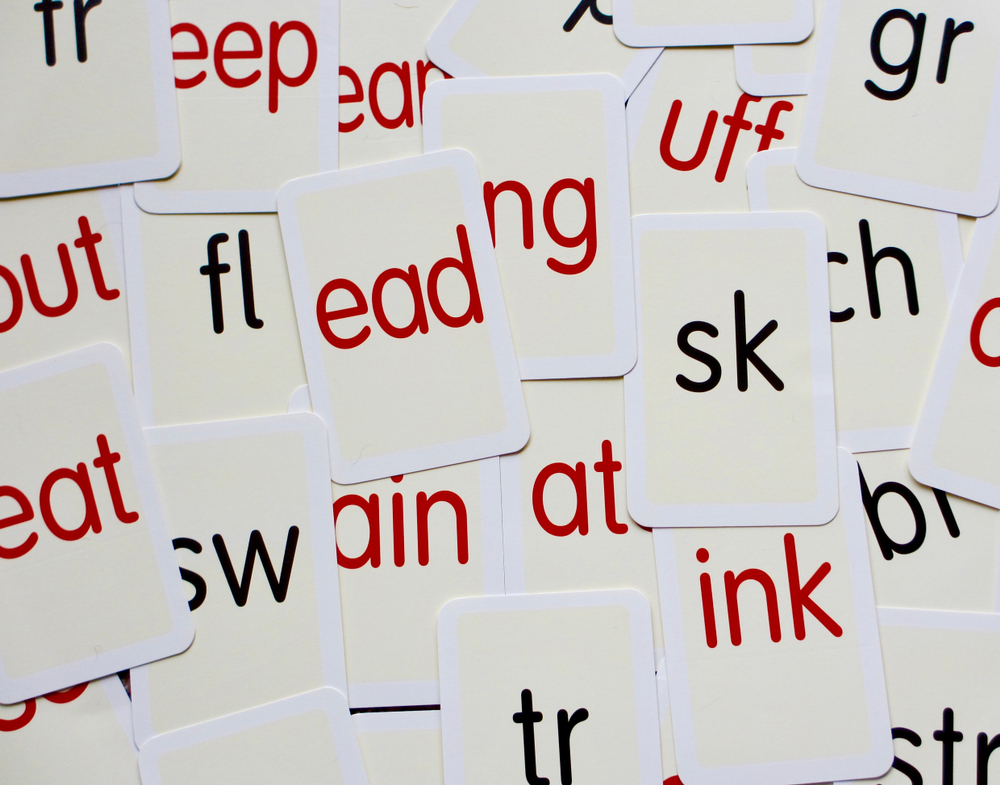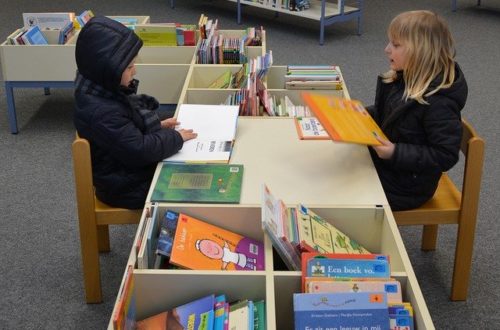In 2009, I was a twenty-something who had recently left an administrative job at Columbia to tutor full-time. I hadn’t set out to focus on English—my B.A. is in French, the subject I started out tutoring—but I eventually realized that adding English to my repertoire would open up a lot more job opportunities. Sure enough, that’s what people mostly hired me for; and since most of my students were in high school, I inevitably ended up doing a lot of SAT prep.
The more I tutored, the fewer skills I realized I could take for granted in my students, but one day I found myself working with a girl whose reading process struck me as downright bizarre. Rather than move her eyes across the text in a linear, left-to-right manner, her eyes would race around the page, scanning aimlessly and then lighting on random sections.
This was not normal skimming; there was an extraordinarily erratic, disjointed quality to it. She was a very smart girl and a good student, but her understanding of what she read was inevitably affected by the scattered way in which she absorbed text.
I was baffled. I had never seen anything like it—indeed, I could not have even guessed that this type of reading problem existed, so far was it from my previous experience. At the time, I assumed it was a one-off situation.
Over the next couple of years, however, I encountered additional students who read in the same darting, scattered way. Soon, and to my dismay, I was no longer surprised to encounter it.
In addition, I noticed that a striking number of my students were disproportionately stymied by unfamiliar words. The issue was not that they had difficulty sounding them out—in fact, it did not even seem to occur to them that they could sound them out. Instead, they guessed semi-randomly, typically plugging in a term that began with the same letter or that contained a similar combination of letters, not really registering when the word they plugged in did not make sense.
Frequently, they confused similar-looking words, e.g., reading diffident as different or defer as differ. In some cases, they assumed that because they words looked similar, they had similar meanings.
They omitted letters, added letters, skipped words, and sometimes skipped entire lines, all without noticing.
When I had them put their finger on the page and follow along as they read, they were unable to coordinate the movement of their hand with that of their eyes—their finger moved in a jerky motion, lagging behind for a few words and then suddenly skipping ahead.
Proper names gave them particular trouble: because there were typically no context clues they could use to even take a stab at these, I spent a good amount of time saying things like, “Just call her Mrs. O.” so that they wouldn’t spend five minutes puzzling over a word they had no hope of figuring out.
Sometimes, when confronted with an unfamiliar word, they would simply turn to me and guilelessly inquire, “Is that a name?”
These were high-school juniors, generally high-achieving students, virtually all from highly advantaged backgrounds, and the product of supposedly excellent schools. Furthermore, I was seeing the issue in students from a variety of schools, in different states, so obviously something more systemic was wrong. It defied common sense to assume that these students all “just happened” to have undiagnosed learning disabilities. A far more reasonable conclusion was that there was a problem with the way they had been taught.
This was not what I signed up for when I started tutoring the SAT. I had been trained by people who assumed that students possessed a whole host of relatively sophisticated reading skills, and I adhered to their methods because they were all I knew… that is, until it became evident that my students required something much more, and that many people had missed the problem along the way.
No matter how much test-prep tutoring these kids got, they inevitably hit a wall: there were too many missing pieces to compensate for, in too short a time.
I was frustrated. They were frustrated. Their parents were frustrated.
How, I wondered, had they managed to slide by for so many years? Had no one ever noticed that they were guessing when they read? And if they had, why did no one seem worried about it?
At the same time, I noticed that my students who had been diagnosed with learning disabilities and received some form of remediation were often stronger decoders. Even if their overall comprehension was weaker, they were able to read the words on the page more accurately.
I had never been to ed school, and I did not have any formal theoretical training in teaching elementary-level reading, but I had years of practical experience studying and tutoring various languages, and I knew enough to suspect that something was seriously amiss with how so-called “normal” students were taught to read.
So I started doing research.
I learned about the Whole-Language movement and the reading wars, eventually drawing the obvious conclusion that many of my students did not attempt to sound words out because they had literally never been taught to do so. Most likely, they read through a combination of memorization and guesswork, without worrying too much about the specifics.
Then I met Richard McManus through a colleague who was studying precision teaching, and I began to learn about the importance of identifying vowel sounds and of building speed and automaticity. Many of my clients seemed to assume that getting extra time on the SAT or (especially) the ACT was a cure-all, but I realized that in many cases, even this wasn’t a particularly effective band-aid solution: in reading, skill is speed, at least up to a certain point. Ultimately, a disproportionate number of those extra-time students crashed and burned in college.
I also discovered Emily Hanford’s report on the shortcomings of so-called “Balanced Literacy” (often Whole Language in disguise) and realized that what looked like a truce in the reading wars in fact hid a roiling debate.
But all that still didn’t really explain the crazy looping around the page.
Then, in April of 2019, I attended an MIT conference on the science of reading, after which Richard introduced me to Nancy Duggan, the head of the Massachusetts chapter of Decoding Dyslexia. In the course of our conversation, I mentioned the “looping” issue; without missing a beat, she responded, “Oh, that’s the three-cueing system. Kids are supposed to look at the beginning of the word and then look at the pictures.”
And I thought: Wait, what? You mean they’re not even supposed to try to read the words? They’re supposed to look at just the first letters and then immediately look somewhere else? What happens when the pictures get taken away? Does it never occur to people that there are literally thousands of words that start with each letter? Sure, English isn’t perfectly regular, but that’s no reason to ignore the patterns that DO exist. Who in their right mind could seriously think this is an acceptable way to teach children to read?
Just like that, I was yanked onto a front of the reading wars I barely knew existed.
I had heard a lot of stories about weird pedagogical fads (one of my best friends is a public-school teacher), but this… this was just about the craziest thing I had ever been told. I went back to the article in which I had originally encountered the term “three-cueing system” and kept reading and rereading it until I finally understood just how the American system of reading instruction had gone haywire—right under everyone’s nose and without anyone on the outside really noticing (save for Emily Hanford).
The more I read, the more I got the sense that I had tumbled down a rabbit hole and into an alternate universe in which reading was detached from the notion that books say what they say because they consist of specific words written in a particular order, and that those words in turn say what they say because they consist of specific letters written in specific combinations and not in others.
Someone who has spent a lot of time immersed in the world of early-elementary education might not understand why I was so shocked by this discovery, but my own education was fairly traditional, and I had always tutored independently. I hadn’t ever spent time in an environment where people blithely spouted edu-jargon and acted as though this kind of magical thinking was effective, or that kids learned to read well because of rather than despite it. I did what I did because it worked, not because it conformed to any particular theory.
And then there was the fact that I had spent years getting up close and personal with the long-term fallout of disordered reading pedagogy, in a way that teachers of young children almost never do. I sat next to high school students as they guessed and flailed and muddled, and I saw how curriculums designed to make six-year-olds love reading were inadvertently creating sixteen-year-olds who couldn’t stand it.
I saw how strategies that could produce something that gave the illusion of proficiency in young children fell apart when the texts got too hard and the variables too numerous and complex to control.
I saw how children from advantaged backgrounds could either get taught at home or get sent to a tutor, allowing schools to ignore the problem, while poor children simply didn’t learn.
I saw how the educational community turned its collective head away, preferring to insist that students would eventually just pick up what they needed if they read enough “just right” books or, failing that, suggest they get a psych workup and a 504 to qualify for some kind of diagnosis and extra time because really, what else is there to do? The problem was always assumed to lie with the individual student rather than the system.
I learned about the dearth of comprehensive phonics training in elementary-education programs and discovered how teachers themselves were being failed by the colleges and universities responsible for preparing them, then given inadequate support once they got into the classroom.
I saw how science—and, more importantly, common sense—took a back seat to ideology and educational theory.
I saw how matters that were effectively settled in the scientific community several decades ago continued to be treated as controversial.
I saw how learning to decode was repeatedly pitted against acquiring a love of reading—as if knowing how to figure out what the words on a page literally say were somehow incompatible with thinking about their meaning. The idea that students might eventually find it hard to love reading if they didn’t know what the words said invariably went unmentioned.
I also noticed a creeping sense of paranoia among some members of the Balanced Literacy camp: they insisted that the push for phonics was really a conspiracy designed to replace human teachers with virtual instructors and enrich the ed-tech industry. They also increasingly dismissed scientific consensus (or even the legitimacy of scientific inquiry into reading) because they were convinced that it was nothing more than a weapon to further strip teachers of autonomy, or because they could not understand the terminology that researchers used and assumed that it was only being trotted out to intimidate them.
As Reid Lyon, the former Chief of the Child Development and Behavior Branch at the National Institute of Child Health and Human Development (NICHD) at the National Institute of Health (NIH), and one of the most eminent reading researchers put it:
The resistance in the educational community, particularly at the higher education level where teachers are trained, is enormous, almost unbelievable. When you show people objective information, non-philosophically driven research that for these kids, these interactions work very productively such that where a youngster was at the tenth percentile in reading before, and is now at the sixtieth percentile in reading, and you can show that time after time, but you still see substantial resistance from the educational community, it begins to tell us that many of these issues are way beyond the kid issues, these are adult issues. They are fascinating adult issues where human beings are latching on to their beliefs, their assumptions, their egos and their careers rather than looking very clearly at what works, what doesn’t, making sure people know what works, measuring it and getting the kids up to snuff.
To be very clear, I am not insisting that phonics is some sort of magic bullet that can miraculously turn every child into a stellar reader; it’s only half of the reading equation, and some of the other pieces are far more complex.
I am also not suggesting that learning to read phonetically is always an easy process. Some children will take to it naturally, as is true for any skill, while others will find it more of a challenge. And not every child is going to end up loving reading, just as not every child is going to love sports, or music, or science.
But even though decoding ability alone is insufficient for reading, it is still absolutely necessary—in fact, it is the central building block on which competent reading is based. And research shows that in the long-term, difficulty learning to read does not predict ultimate ability. In other words, some kids who initially struggle to sound out words will turn into excellent and perhaps even enthusiastic readers.
As for kids who seem to pick things up naturally… yes, there will be some review. But potential gaps will also get plugged, meaning that a decade down the line, these children will be a lot less likely to resort to the kind of guessing I repeatedly encountered.
On the other hand, a child who gets excited about reciting texts with which they are already familiar but who cannot read a new book because they cannot figure out the words, is a child who cannot really read, and a child who cannot really read is a child who is being set up for failure down the line—and it is deeply disingenuous for adults to pretend otherwise.
Insisting that the problem “will just take care of itself,” or “s/he just isn’t ready to read yet” when a child has been deprived of the tools to make literal sense out of text is cruel, no matter how well-intentioned adults may be.
Sooner or later the reality will become apparent, and the discouragement and the frustration and the shame will set in. And once that happens, the psychological roadblocks make problems exponentially more difficult to remedy. I think everyone would agree that it’s better to focus on preventing them in the first place.
Let me close by emphasizing that reading is also an intensely personal issue for me. Throughout my childhood, books were my key to the world, and I have remained a ravenous imbiber of words ever since. It seems to me brutally unfair that anyone should be denied that kind of experience because of romanticized adult notions about education. If I can help prevent that from happening on even a very small scale, I’ll consider this site a success.





